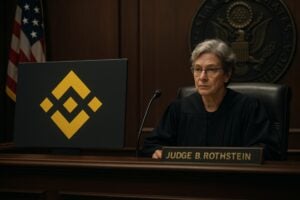The cryptocurrency giant Binance has achieved a significant legal victory: a federal judge has approved the transfer of a money laundering case from the state of Washington to the Southern District of Florida, where a similar proceeding is already underway.
The decision, issued on April 21 by Judge Barbara Rothstein, is based on the so-called “first-to-file rule”. This is a rule aimed at avoiding the duplication of legal proceedings.
Two causes, Washington and Florida, a single objective: to accuse Binance of facilitating money laundering
Both the case in Washington and the one in Florida accuse Binance of allowing cybercriminals to launder stolen cryptocurrencies through its platform.
Despite some formal differences between the two legal actions, Judge Rothstein emphasized that both represent individuals whose cryptocurrencies would have been stolen and then transferred to Binance accounts.
The lawsuit in Florida, initiated in June 2023 by Michael Osterer, was the first to be filed. The one in Washington, on the other hand, was filed in August 2024 by three cryptocurrency investors.
The plaintiffs from Washington argued that their case introduced new charges and also included the former CEO of Binance, Changpeng “CZ” Zhao, as a defendant, thus differentiating it from the proceedings in Florida.
According to the first-to-file rule, when two lawsuits involve the same parties and similar issues, jurisdiction generally remains with the court where it was first filed.
Judge Rothstein dismissed the objections of the Washington plaintiffs. They feared that the transfer could delay the process and damage the chances of obtaining compensation.
On the contrary, the judge stated that unifying the proceedings would be advantageous for the efficiency of the judicial system.
“Allowing two parallel class actions to proceed in separate districts would be duplicative and inefficient”,
wrote in his decision.
With the approved transfer, both cases will now be handled by the Florida court. With the aim of accelerating the resolution and reducing legal redundancies for both Binance and the plaintiffs.
The CZ case and the new accusations from the Wall Street Journal
In the meantime, the former CEO of Binance, Changpeng Zhao, known as CZ, is back in the spotlight due to a new report published by the Wall Street Journal on April 11.
According to the newspaper, Zhao is said to have agreed to testify against Justin Sun, founder of Tron, as part of an agreement with the United States Department of Justice (DOJ).
Zhao promptly denied the claims, writing on X (formerly Twitter):
“WSJ is really trying. It seems they have forgotten who ended up in prison and who did not. The people who become government witnesses do not end up in prison.”
In the month of April 2024, CZ was sentenced to four months in prison for violations of anti-money laundering regulations.
He was released in September, still holding the title of the richest person to have ever served a prison sentence in the United States, with an estimated net worth of 60 billion dollars at the time of his detention.
In any case, in addition to the legal events in the United States, Binance is also involved in a legal dispute in Nigeria.
A local court recently postponed an important tax evasion case to April 30 against the cryptocurrency exchange. This occurred after Binance challenged the validity of the service of legal documents.
According to Binance’s lawyer, Chukwuka Ikwuazom, the Federal Inland Revenue Service (FIRS) would not have obtained the court’s authorization to serve legal documents outside Nigerian territory.
The court order of February 11 authorizing the substitute notification would therefore be devoid of legal validity. Binance, in fact, is registered in the Cayman Islands and does not have a physical office in Nigeria.
Future implications for Binance and the crypto sector
The transfer of the case to Florida represents a crucial moment for Binance, which is facing legal pressures on multiple fronts.
The decision of Judge Rothstein might not only simplify the judicial path but also offer Binance the opportunity to consolidate its defense in a single venue. Thus reducing the costs and risks arising from parallel proceedings.
However, the accusations of money laundering and the implications related to CZ’s involvement in other legal cases continue to cast shadows on the reputation of the exchange.
The growing attention of regulatory and judicial authorities, both in the United States and internationally, signals a tightening of oversight on the cryptocurrency sector.
As these cases evolve, it will be crucial to observe how Binance will tackle the legal challenges and whether it will manage to maintain the trust of users and investors in an increasingly complex and regulated environment.
